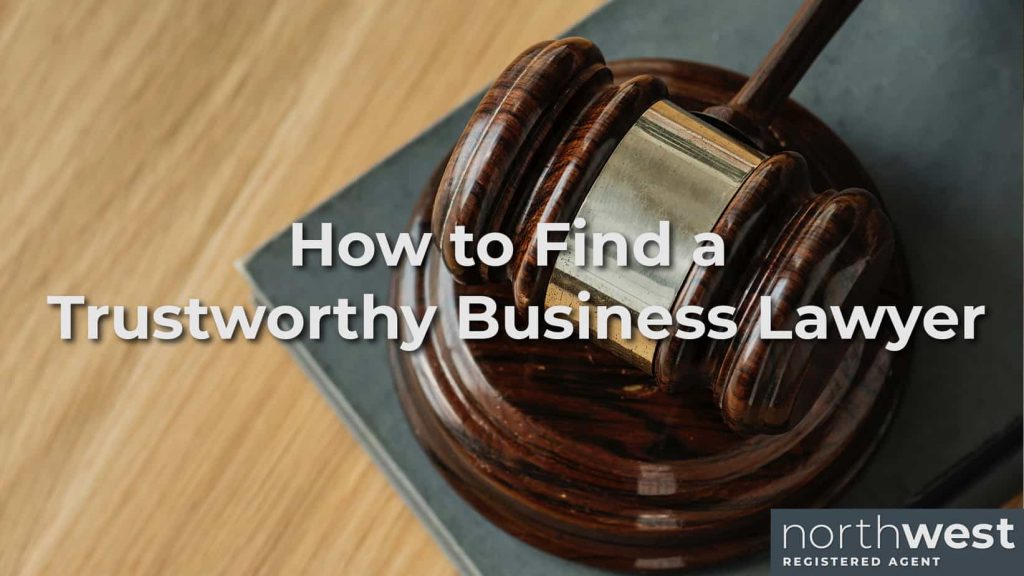How to Find a Trustworthy Business Lawyer

The Hollywood image of a corporate lawyer is essentially that of a slick car salesman in a fancy suit—so it’s natural to be a bit apprehensive about finding a trustworthy business lawyer. You want to find someone who can help your business with its legal needs without nickel-and-diming you into bankruptcy. Luckily, finding a good business lawyer is really much like hiring any contractor.
Why do I need a business lawyer?
So much of business is navigating the many, many legalities specific to the business world. Need to negotiate any kind of contract or lease? Want to ensure you maintain rights to all your intellectual property? Plan to write a terms of service or licensing agreement? Considering any major changes to your business, such as a merger? Want to get out of a bad business relationship or fire a difficult employee? For any and all of these situations and more, you’ll need to know exactly what is and isn’t legal, what’s standard or expected, and what’s going to benefit your business the most. If you’re not a lawyer yourself, odds are that you don’t know all the ins and outs of specific legal areas, such as contract or intellectual property law.
One of the keys to running a successful business is knowing what you can handle and knowing what you should delegate to those with more knowledge and experience. Remember that your time is money, so there will come a point where spending hours researching a topic is going to cost you more than passing it off to a lawyer—especially if you still fail to make the most beneficial moves after days of research.
And of course, if your business runs into any legal issues, such as a lawsuit, you’ll most certainly need a lawyer.
When should I get a business lawyer?
Don’t wait until you have legal problems to hire a lawyer. Think of your lawyer like your dentist. Too many people only visit the dentist once their tooth pain is keeping them up at night—meaning at best, they’re in for hundreds or even thousands of dollars of dental work. Making appointments for regular dental checkups, however, is preventative and can keep you from ever having to deal with root canals, extractions, abscesses, or other dental nightmares.
Likewise, hiring an attorney to keep you out of trouble in the first place is much more effective than hiring one after you’ve already been sued. You can get useful advice and warnings about the potential legal ramifications of your business’s actions and ensure that the moves you make are within the scope of the law. Some people even hire a lawyer before they start doing any business at all, so that they can get assistance with initial organization and set up.
How do I find a business lawyer I can trust?
Before you actually start scouting for a lawyer, you should take a few moments to consider what qualifications will be most important to you.
Experience is typically the number one item on everyone’s list. You don’t just want a lawyer that’s practiced law for many years—you want a lawyer that has specific experience in what you’re planning to have them do. For instance, if your business deals extensively with copyright issues, you want a lawyer experienced with copyright law. Experience in your specific industry is also a huge plus. If possible, however, try to find a lawyer that isn’t representing your direct competitors. This can be difficult if there aren’t many experienced lawyers in your industry or area, but it’s worth an extra look around. Although lawyers are bound to confidentiality, there’s always a slim chance your lawyer may accidentally let business information slip—and no one wants to unwittingly give a leg up to the competition.
Communication skills are also essential. Lawyers, in a sense, are translators. They explain legal language and concepts to you, and help you see how the law can potentially help or hinder your business ideas. When speaking with potential lawyers, they should be comfortable to talk to and easy to understand. Watch out that they aren’t just smooth talkers, however. Ask tough questions and really tune in to how they respond. If they wave away your questions and concerns and turn up the charm, they may be all flash and no substance.
Once you have a rough idea of what to look for, there’s a few ways to actually find a lawyer. Many businesses start their searches online with the American Bar Association, their state’s bar association or online attorney databases like UpCounsel or Avvo. Referrals can also be a great resource—talk to other business owners and see if they’ve worked with any attorneys they would recommend. Also, look to your city or state’s resources for businesses. For instance, most states have organizations that help small businesses connect to local resources.
When you’ve found a lawyer you’re interested in, it’s time for some background research. Most importantly, ensure your potential lawyer is currently licensed by the bar in your state (a good place to start is your state bar’s website). If the lawyer or their firm has a website, read through it. Check out their LinkedIn profile if they have one. Get as much information as you can. After you’ve found a good candidate, you can request a consultation.
How do I know I won’t get overcharged?
Billing is complicated, but there are some basic requests you can make to help ensure that your lawyer will charge you fairly.
What most clients are worried about is unexpected expenses. A trustworthy lawyer should be able to clearly break down their fees and be willing to put their fees—including any expenses that should be reimbursed—in writing in the initial engagement letter. You want to know exactly what’s included and what’s extra, so you’re not hit with unexpected fees for expenses such as printer copies or postage (or fancy dinners).
For hourly fees, your lawyer should be able to provide you a written estimate of what a particular service will cost in total. They should also request authorization from you if that estimate will be substantially exceeded. For some services, you may even be able to negotiate a cap for the maximum amount you’ll pay.
You’ll also want to learn how those hourly rates break down. If a task takes twenty minutes, does that count as a third of an hour or is that time rounded up to a half hour or a full hour? Also, will more than one attorney at a firm be working for you? If so, it’s a good idea to request the individual hourly rate of each person who will do work for you—the top dog lawyer getting $300 an hour probably doesn’t handle all the little stuff alone, so you don’t want to pay $300 an hour if an associate with a lower hourly rate is actually doing the work.
It’s a good idea to request regular, clearly itemized invoices too. If you get monthly invoices, you’ll quickly see how much you’re being charged and how reasonable the charges are. If you don’t like what you see, you can make adjustments (or find a new lawyer) before your bill gets too high. You definitely don’t want to see your first invoice after your lawyer has done months and months of work.
If you find your potential lawyer’s fees are too confusing, vague, or just plain weird (maybe they try to seek business equity instead of a cash for their fee), move on. On the flip side, note that there are limits to what you can reasonably demand. For instance, as much as you may just want to pay a flat fee for everything, you’ll likely need to pay hourly rates for lawsuits or negotiations, as these can run the gamut from short and simple to frustratingly long and drawn out. And while this should go without saying, you should expect to pay for a lawyer. It’s not like TV, where every lawyer has a heart of gold and is happy to offer their services for free or on contingency. Legal services are like any other contracted service, and you’ll have to pay people for their time and expertise.
And just like any other contracted service, knowing what you need and taking the time to do your homework are the keys to finding the best person for the job.



